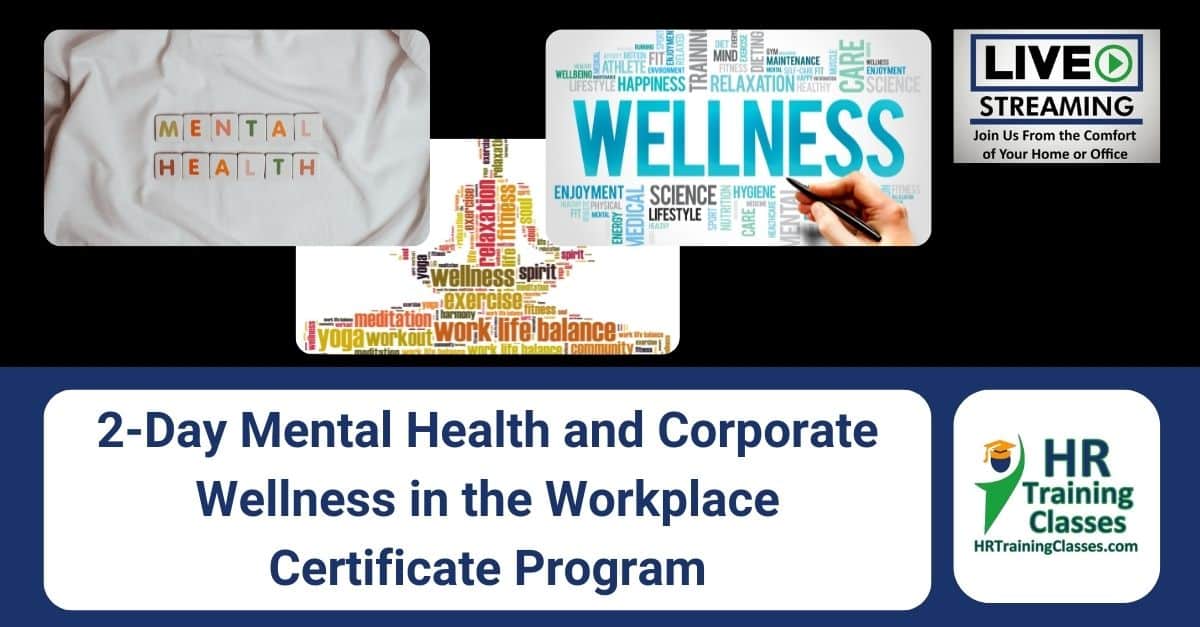Continuing Education Credits
HRCI – 13 HR(General) Credits • SHRM – 13 PDC’s
Schedule
- Day 1 – 9:00 AM – 5:00 PM Central Time
- 15 Minute Break at 11:15 PM CT
- 1 Hour Lunch at 1:00 PM CT
- 15 Minute Break at 3:45 PM CT
- Day 2 – 9:00 AM – 5:00 PM Central Time
- 15 Minute Break at 11:15 PM CT
- 1 Hour Lunch at 1:00 PM CT
- 15 Minute Break at 3:45 PM CT
In these uncertain times, organizations are striving to establish a new balance in the workplace. This involves ensuring stability and providing assurance amidst the volatile, unpredictable environment. At the core of all high-performing organizations lie healthy, productive individuals who drive progress and success. As such, it is imperative to protect and promote mental health within the professional sphere, particularly for those in managerial roles tasked with supervising and guiding others.
Our 2-Day Mental Health and Corporate Wellness in the Workplace Certificate Program is an essential step towards this goal. This comprehensive training will empower you with crucial knowledge and practical tools to create a robust work environment that prioritizes both physical and mental health. The program is specially designed to assist you in recognizing the signs and symptoms of various mental health conditions, understanding their impact on performance and productivity, and acting effectively to support affected individuals.
This course is not merely about mental health awareness. It’s about transforming the culture of your organization to be inclusive and supportive, allowing individuals with mental health conditions to participate fully and equitably in the workplace. We will guide you through implementing comprehensive mental health strategies, creating wellness programs, and promoting healthy behaviors. You’ll also learn about mental health legislation, such as the Mental Health Parity Act and the Family Medical Leave Act, and how they intersect with corporate policies.
Moreover, we will provide insights into the role of Employee Assistance Programs (EAPs) and their benefits. We will delve into the crucial aspect of the Americans with Disabilities Act (ADA) and its provisions for reasonable accommodation. We will also discuss how to create a culture of wellness by promoting healthy eating, encouraging breaks, and maintaining a substance-free environment, along with strategies for evaluating program results and sharing achievements.
The training concludes with a glimpse into the future: we’ll discuss the trends expected in 2023 and beyond for healthier, happier workplaces. By participating in this program, you’ll be well-equipped to lead your team toward better mental and physical health, foster an environment of understanding and empathy, and ultimately drive higher productivity and performance. Our goal is to empower you to become not just a manager or supervisor, but a wellness advocate in your workplace.
Day 1: Focusing on Mental Health
- Introduction to Employee Well-being and Mental Health: Understanding the basics of mental health and its importance in the workplace, including its impact on performance and various factors that influence it.
- Six Pillars of Employee Well-being: Introduction to the six key areas that contribute to a healthy, balanced working life.
- Common Mental Health Issues in the Workplace: Examination of common mental health conditions, their signs, and symptoms.
- Supporting Employees with Mental Health Conditions: Detailed strategies and approaches for supporting employees dealing with conditions such as stress/burnout, depression, anxiety, bipolar disorder, PTSD, schizophrenia, and more.
- Mental Health Legislation: Overview of the Mental Health Parity Act, its implications for benefits, the FMLA, and their interconnectedness.
- Employee Assistance Programs (EAPs): Exploring the role, benefits, and cost considerations of EAPs.
- ADA & Reasonable Accommodation: Detailed look into the Americans with Disabilities Act (ADA), its definition of disability, and the process of providing reasonable accommodation.
- Workplace Culture and Mental Health: Examination of topics like flexible work arrangements, mental health stigma, leadership roles, suicide prevention, and more.
Day 2: Establishing a Health and Wellness Program
- The Importance of Employee Well-being: How employee well-being affects productivity, healthcare costs, absenteeism, and turnover.
- Types of Health and Wellness Programs: Overview of various programs, including those focused on nutrition, weight loss, tobacco cessation, health screenings, mental health, and injury prevention.
- Promoting Healthy Behaviors: Strategies for promoting physical activity, healthy eating, tobacco cessation, and substance abuse treatment.
- Health Screenings and Maintenance Programs: Detailed exploration of preventative care screenings, general health risk assessments, annual examinations, and more.
- Mental Health Programs: Overview of stress management techniques, support groups, counseling services, and educational efforts.
- Evaluating the Need: Identification of environmental factors, common health conditions, and procedures, as well as reviewing company information related to employee health.
- Planning Process: Forming a health & wellness team, defining goals, and budgeting.
- Implementation: How to obtain management support, test out the program, promote the program, and motivate employees with incentives.
- Creating a Culture of Wellness: Strategies for promoting healthy eating, encouraging breaks, maintaining an alcohol, drug, and smoke-free environment, and eliminating hazards.
- Evaluate Results: Techniques for measuring employee satisfaction, revising plans as necessary, and sharing achievements.
The training concludes with a look at trends for a healthier, happier workforce in 2023, and a final review and post-test.

